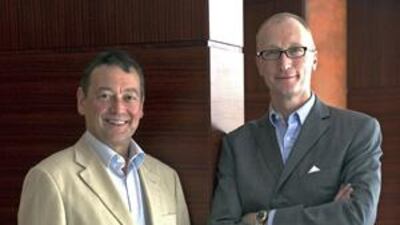The UAE needs a more flexible legal infrastructure for freelance workers if its media industry is to become the region's leader, the media consultants behind projects including the capital's twofour54 media zone and BBC Persian TV say. Chris O'Hearn, the general manager for DMA Media Middle East, says the largest burden media companies in the GCC have to bear is the high cost of flying in freelance talent from overseas. Local laws prohibit freelancing, and media free zones charge thousands of dollars for a freelance licence. "It's not access to talent that's the problem, it's access to flexible talent that's the problem," Mr O'Hearn said. Film and television directors need to be able to create production crews quickly around projects with tight deadlines, without always having the high costs of plane fares and hotel bills, he said. Last month, RAK Media City stopped offering freelance visas, leaving UAE-based freelancers with no choice but to register with Dubai Media City, which charges Dh24,500 (US$6,670) a year plus fees. To try to help ease the problem, twofour54 is planning to announce a new freelance visa scheme in conjunction with the launch of its studio division, Intaj, later this month. "We recognise the need for a freelance solution to assist the development of the industry, and are finalising details which we will be announcing on the 27th at our twofour54 intaj studio facility launch," said Tony Orsten, the chief executive of twofour54. DMA, which has its headquarters in London and has launched TV stations from Pakistan to Johannesburg, has played a key role in shaping the media zone, having been hired as media consultant in the autumn of 2007, nearly a year before the zone was launched publicly. Last year, the company formed its Middle East division, DMA Media Middle East, which is based in the zone. Rob Beynon, the chief executive of DMA Media, said the Middle East media market provided a rich opportunity at a time when more mature markets, such as the UK, were contracting. "The Middle East is a market which has not reached its full potential yet," he said. "It's a market that has exploded in the last 10 years. The appetite for technology here is great." Some of the latest technology that DMA has helped to bring into the region is already being used by Abu Dhabi TV in the new twofour54 studios, temporarily located within the Abu Dhabi Media Company campus. DMA helped to overhaul one of Abu Dhabi TV's Arabic-language news programmes, and helped to design Inside The National, a nightly news programme which interviews reporters from The National newspaper about their stories. More technology will be on display at the end of the month at the zone's studios in its campus near Khalifa Park. DMA, having built a reputation as a consultancy that specialises in launching new media ventures, is now moving towards being a company that supports them. "Increasingly, what we are doing is outsourcing for broadcasters who don't have the skills in-house," Mr Beynon said. khagey@thenational.ae

Media consultants: Better infrastructure for freelances needed
A more flexible and affordable legal infrastructure for freelance workers is needed if the country's media industry is to become the region's leader, media consultants say.
Most popular today
